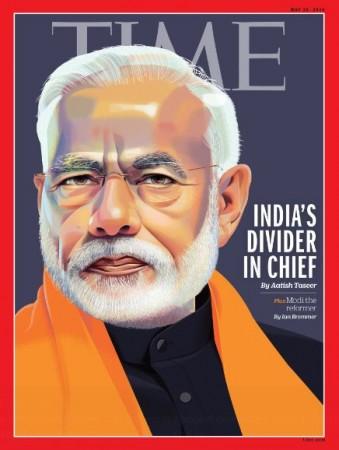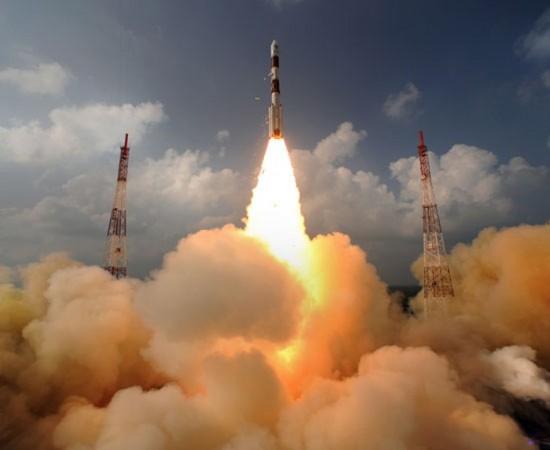
The Time magazine has seemingly concluded that Indian democracy won't last beyond the ongoing general elections. It featured Prime Minister Narendra Modi on the cover of its international edition dated May 20. The cryptic descriptor for Modi is 'India's divider in chief.'
Beyond the cover, the lead article, written by Pakistani origin journalist Aatish Taseer, is headlined "Can the World's Largest Democracy Endure Another Five Years of a Modi Government?"
Interestingly, the article also condemns Congress, the main opposition party. Taseer calls Congress leader Rahul Gandhi an 'unteachable mediocrity'. So it looks like the revered Time has a very glum view of India's democracy. Modi the divider must go but the mediocre Rahul is incapable of giving the largest democracy any direction either!
The article, which does make insightful observations in patches, doesn't, thankfully, prescribe which political party can restore sanity to Indian democracy. Taseer should have offered his invaluable opinion on this as well. Maybe in the next Time magazine cover story, please?
The article starts by stating, "Of the great democracies to fall to populism, India was the first." It then goes on to reduce the prime minister to a 'friend of the mob'.
Sadly, the Time is looking in the wrong direction to peddle its democracy obituary. India isn't where democracy will die soon, dear Time. you need to look elsewhere. Maybe Time should ask Taseer to write an honest piece on Pakistan's historic contributions to democracy.
Deep-seated anti-India bias?
The leader headline, which suggests Indian democracy would crumble if Modi gets another 5 years, has stooped to the standards of the basest jokes and memes populating WhatsApp, the low life in information hierarchy currently. A publication of Time's esteem should have pitched its headline with better taste.
If anything the Time cover and the leader just betrays the deep-seated anti-India bias in the so-called liberal media circles in the West. The Indian nation survived, against all odds, because it has had a vibrant democracy. If Modi isn't good for India, Indians will reject him. Deprecating the people's mandate in the world's largest democracy as mobs' choice is a cheap shot.
Leave the mandate in the hands of Indians. Self-appointed liberal guardians of democracy have no right to insult a country's democratic process.
The same bias was at display in the coverage of the Pulwama terror attack in February in Kashmir in which 40 CRPF soldiers travelling in a bus were martyred.
Overtones in Pulwama coverage
For New York Times, another liberal flag bearer, the Pulwama terror attack was just an 'explosion'. The outrageous NYT headline was this - 'In India's Election Season, an Explosion Interrupts Modi's Slump'. A terror attack linked to elections in the headline - the overtones are hard to miss.
NYT's entire coverage of the India-Pakistan standoff in the wake of the Pulwama terror attack reeked of plain and blunt anti-India bias.
NYT led the one-sided Western press coverage over Pulwama and Balakot. For almost all of them, Pulwama attack was just an incident in Kashmir. Make a note, NOT in India. And, the Balakot air strike was merely a revenge attack. It wasn't reported as the pre-emptive air strike on terror cells inside Pakistan, which India said it was.
When Pakistan said no one was killed in Balakot everyone reported it that way, without seeking evidence. The Indian claim wasn't reported and when indeed it was, the lean was on the missing evidence. Reuters was happy to report that there was no damage to buildings at the Balakot hill top, but admitted its crew didn't visit the spot.
When Indian Air Force pilot Abhinandan Varthaman was captured, the western media gave the verdict that India 'lost' the dog fight. The Indian claim that the IAF shot down a Pak F-16, that wasn't reported.
Throughout the coverage, the liberal press in the West conspicuously created the image that Pakistan was the winner, the mature folk, the people who would de-escalate the crisis and the ones who would treat the captured pilot well. For them India was everything opposite.
You may have an axe to grind against Modi, but a blunt twisting of reportage by some of the most hallowed names in journalism was a disappointing sight. The following sequence of NYT reporting is an example, as Vamsee Juluri has brilliantly analysed in his piece in Medium.
For the pundits at NYT, India' Balakot air strike was merely an act of political symbolism, a euphemism for saying that India was staging it, and by extension the Pulwama attack, for political gains.
When Abhinandan was captured the NYT pundits averred: "The capture of the Indian pilot may only weaken his (Modi's) position and lead to a dangerous escalation if Mr Modi chooses to respond militarily." They just wanted to go on with the narrative that Modi instigated the crisis, and now that he's 'defeated' the region was at the brink of a nuclear conflagration! Well, for the liberal men in New York, Modi is a cave man who does the bidding of the milling mobs in a dirty India.
Modi should have escalated the crisis if the pundits were right. But Modi didn't. They must have been a disappointed lot.
NYT apology on Mars mission cartoon

In October 2014, some six months after Modi came to power, India successfully put a robotic probe into orbit around Mars, saying it was one of the cheapest interplanetary space missions ever. NYT soon came up with an offensive cartoon, for which it apologised later.
It's all probably the Modi effect. Had another dispensation been in power in New Delhi, the liberal media pontiffs in New York Times and the Time magazine would have offered a more fair coverage - whether it's Mars mission, Pulwama attack or 2019 general election.
Modi is obviously getting under the skin of far too many people - and they are all honourable men!
(The author is Managing Editor, International Business Times, India. Views are personal. Reach the author at j.jacob@ibtimes.co.in)








